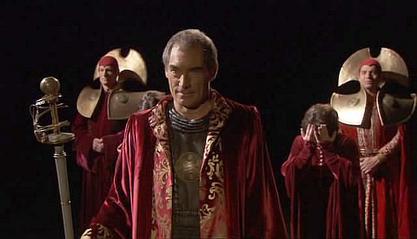One of the things I've been doing is catching up on Doctor Who, including watching some of the older series episodes. That's all well and good, but the ideas there have given me some things to think about in terms of a possible game. Right now, I'm thinking of it in terms of GURPS, but I'm sure that other systems could serve as well.
 |
| This scene exists forever, always, embedded in every moment. |
I am also quite fond of alternate timelines, so that would violate one of the critical canon rules of Doctor Who (which has made a significant plot point of the near-complete separation of alternate timelines). So, my idea would be that there are several dimensions, or spheres, in which players can interact with the game universe: different areas of space, different areas of time, different timelines (with their own areas of space and time), and metatemporal/mythic "space".
At least one of the characters would be a "Time Lord" equivalent (not sure what they'd be called), who has undergone an initiatory experience similar to the Gallifreyans' exposure to the Time Vortex or Zelazny's Amberites' walking of the Pattern. That character would have access to a trans/metatemporal vessel like the Doctor's TARDIS which would have the ability to travel anywhere in space, time, across transtemporal lines, or into metatemporal space. There should probably be limits to that, for dramatic purposes, but I am not sure at the moment what they should be exactly. Something that limits how often the players can change their position in space/time/transtime/metatime would probably be important, and perhaps also how "far" the vessel can change position in any given period. That latter, though, may not be necessary, and might even be undesirable.
The players should be given access to some extreme high-tech items that minimize their need to engage in normal commerce, as the point would be exploration, not normal economics. We don't want to have the players setting themselves up as transtemporal merchants, for instance. So, some sort of food dispenser would be required, and perhaps other post-scarcity items of technology (replicators? utility fog? some sort of immortality or other cure for death?) would have a useful place in the setting. The point, after all, would be universal tourism, not the normal sorts of adventure drivers. Certainly, giving the players' vessel more space inside than out would be a given, allowing the vessel to more easily serve as a base of operations while also letting it be unobtrusive when necessary.
Basically, I don't think that many gaming versions of time travel have really touched on the possibilities and intense strangeness involved in the subject. It would be fun to explore those.

I haven't put much to paper (or blog) yet, but using time travel in a campaign world has been much on my mind lately... trying to determine a logical handling of the topic that makes sense to me, that helps me build a campaign universe, and that allows for in-game use by players without causing so much change that I crumble under the campaign maintenance burden!
ReplyDeleteThat's one of the things that concerns me. It's not practical to run a time travel game as a complete sandbox. As a result, the Referee is going to have to be involved in the story generation side of the game in a more active manner than I'd prefer. My thinking currently runs that the players have to be directed toward scenarios, but then the Referee can let them go within the context of that scenario (thus the reason that I'd think that limiting how often the time/dimension travel is used is necessary). That is, each story arc is a separate, delimited sandbox. The Referee then is basically creating a new, mostly self-contained world for each session or set of sessions.
Delete